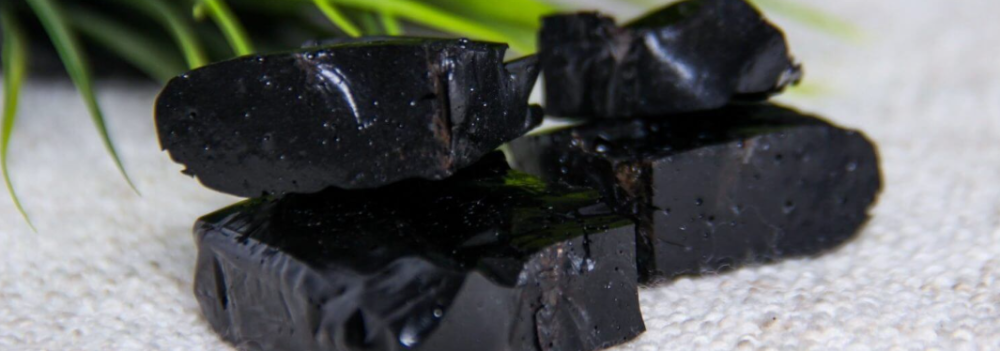Shilajit Resin
I’m going to kick things off by exposing you to something perhaps a bit unusual but fascinating – Shilajit Resin. This ancient substance has roots in Ayurvedic medicine, derived from the Sanskrit words ‘Shila’, meaning ‘rock’, and ‘jit’, which translates to ‘victory’. It’s essentially a tar-like, sticky substance found primarily in the high mountains of Asia, renowned for its healing properties.
You might wonder how a rock could give birth to something as extraordinary as Shilajit. Well, it involves a natural process that’s as unique as the substance itself. Shilajit forms from the slow decomposition of plant matter and minerals, which are compressed over centuries by the immense weight of the mountains. It’s quite literally the byproduct of time and pressure.
Historically speaking, Shilajit has been a part of wellness routines for thousands of years. Traditional healers revered it for its remarkable health benefits and often used it as a panacea. Today, it carries that legacy forward, finding its place in the cabinets of modern health enthusiasts seeking natural ways to support their vitality.
This isn’t just about exploring an ancient remedy, it’s also about understanding the bridge it creates to contemporary wellness. Shilajit’s journey from the past into present-day relevancy highlights respect for tradition and recognizes natural remedies enduring role in health.
Benefits and Uses of Shilajit Resin
One of the reasons why Shilajit Resin is often referred to as the ‘conqueror of mountains are the health benefits it brings to the table.
Composed of humus and organic plant materials compressed by rock layers over millions of years, Shilajit Resin contains fulvic acid, humic acid, and a spectrum of minerals that potentially offer various health advantages.
The Science Behind.
If you want to understand its impact scientifically, several studies have explored Shilajit Resin. Researchers have been investigating its potential to aid in areas such as increasing longevity, enhancing physical performance, and promoting brain health. In particular, fulvic acid, a key component, has been shown to have antioxidant properties and may support the immune system and improve energy levels.
You can always adjust your approach to how you use Shilajit Resin based on your needs. It can be taken as a supplement in powder or liquid form, traditionally mixed with milk, or added to smoothies and other beverages. Some opt to use Shilajit in its pure resin form and dissolve a small portion in liquid to consume. Choosing something that resonates with your lifestyle and health goals is crucial.
My Advice
There’s a lot of opportunity in the realm of natural supplements, and Shilajit Resin seems to have a promising place among them. My advice? Start slow with Shilajit to see how your body responds before increasing the amount as needed. And of course, always consider speaking with a healthcare provider before adding a new supplement to your regimen, especially if you have underlying health conditions.
Now, as we explore these profound benefits further, remember that not all Shilajit products are created equal. In the next section, we’re going to tackle the important aspects of sourcing and safety. You’ll learn how to distinguish high-quality Shilajit Resin and why the purity of this substance is paramount for both your well-being and the environment.
Quality and Safety Considerations
When you’re ready to tap into the potential of Shilajit Resin, knowing how to distinguish high-caliber products is key. Don’t worry too much about being an expert from the get-go; just focus on a few fundamentals. High-quality Shilajit should be resinous, have a distinctive smell, and dissolve in warm water. Beware of powders that could be adulterated and always check for independent testing by reputable labs.
As for safety, Shilajit Resin has a long history of use, but it’s crucial to approach its consumption with knowledge. The recommended dosage can vary, so it’s best to start with smaller amounts and observe your body’s response. It’s also wise to consult with a healthcare provider, especially if you’re taking other medications or have underlying health conditions that could be affected.
Finally, where your Shilajit comes from should matter to you. Look for brands that are transparent about their sourcing and commit to ethical and sustainable harvesting practices. This ensures that the benefits you enjoy are not at the cost of harming the environment or the communities involved in its collection. Remember, supporting responsible brands not only helps maintain the natural balance but also promotes the long-term availability of this precious substance.
Benefits of Shilajit resin.
Some potential benefits of shilajit resin include:
**Rich in minerals**
Shilajit resin is known to be rich in minerals such as fulvic acid, iron, calcium, and magnesium, which are essential for overall health and well-being.
**Antioxidant properties**
Shilajit resin contains antioxidants that help protect the body from damage caused by free radicals, which can contribute to aging and various diseases.
**Anti-inflammatory effects**
Some studies suggest that shilajit resin may have anti-inflammatory properties, which can help reduce inflammation in the body and alleviate symptoms of certain conditions.
**Energy booster**
Shilajit resin is believed to help increase energy levels and combat fatigue, making it a popular supplement for boosting stamina and vitality.
**Immune system support**
The minerals and antioxidants in shilajit resin can help strengthen the immune system, making the body more resilient to infections and illnesses.
**Brain health**
Some research indicates that shilajit resin may have neuroprotective properties and could potentially improve cognitive function and memory.
**Anti-aging effects**
Due to its antioxidant content and ability to promote overall health, shilajit resin is sometimes associated with anti-aging benefits.
Medical News Today
Medical News Today provides their list of potential benefits from using Shilajit as well. You can click on the link to read what they have to say about it.
Who should avoid taking Shilajit?
Don’t take shilajit if you have sickle cell anemia, hemochromatosis (too much iron in your blood), or thalassemia. It’s possible to be allergic to this supplement. Stop taking Shilajit if you develop a rash, increased heart rate, or dizziness.
Where to Buy?
Amazon is probably the easiest for viewing different products side by side and for speedy delivery.
Check this link for your special price.
Final Thoughts.
After using this for the last 2 months I feel surprisingly healthier. Is it because it gives me a psychological boost or are the minerals and nutrients actually kicking in and giving me added health benefits?
It is possibly a bit of both, however I am sleeping better, and my skin is glowing. And my pecker is hitting new highs, who am I to complain?
If I gave you any advice, it would be to start off with a cheaper version of the product. Then decide for yourself which product or brand you want to use after an initial trial period.
Steve.
Some links on this site may be affiliate links, and if you purchase something through these links, I will make a commission on them. There will be no extra cost to you and, you could save money. Please read our full affiliate disclosure. here.
Some of this content was AI-generated.


